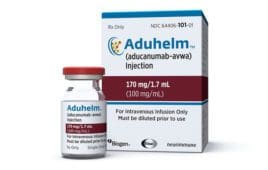 One of the things that differentiates amyotrophic lateral sclerosis (ALS) from other rare diseases is that “it is a catastrophic diagnosis,” said Chris Aiello, Head of Canada and General Manager, Amylyx Pharmaceuticals. “Patients do not really have much to go on in terms of pharmacological treatments.”
One of the things that differentiates amyotrophic lateral sclerosis (ALS) from other rare diseases is that “it is a catastrophic diagnosis,” said Chris Aiello, Head of Canada and General Manager, Amylyx Pharmaceuticals. “Patients do not really have much to go on in terms of pharmacological treatments.”
Last week, Amylyx Pharmaceuticals received Health Canada approval for the ALS therapy Albrioza (AMX0035) with conditions.
The regulatory nod represents the first approval for an ALS drug in recent memory.
A 2017 article in Frontiers in Aging Neuroscience noted that “the overwhelming majority” of human clinical trials for ALS drug candidates failed to show efficacy. Since 1980, there have been more than 80 randomized controlled trials in ALS, and only two therapies, riluzole and edaravone, have found widespread use.

Chris Aiello
“These patients are desperate,” Aiello said.
In 2020, NEJM published positive results on the Phase 2 CENTAUR trial of AMX0035, a combination of sodium phenylbutyrate and taurursodiol.
A 2020 Muscle & Nerve article described the drug’s long-term survival benefit in ALS patients.
This year, the Journal of Neurology, Neurosurgery and Psychiatry published that AMX0035 led to prolonged tracheostomy and ventilation-free survival and reduced occurrence of the first hospitalization. Muscle & Nerve published additional CENTAUR trial analyses related to survival benefit.
The Phase 3 PHOENIX trial of AMX0035 is underway with anticipated results in March 2024.
A substantial number of ALS patients in Canada are interested in Albrioza, Aiello said. “Here, you have a therapy that has demonstrated clinical trial successes. So you can imagine why patients see it as providing some hope,” he explained.
“Certainly, it’s something that we’re going to consider for patients,” said Dr. Ari Breiner, clinical research chair in ALS at the Éric Poulin Centre for Neuromuscular Disease at the University of Ottawa in an article in The Globe and Mail. “Saying to someone, is six months extra with your family valuable? I think the answer is yes.”
It is also likely that a variety of ALS treatments will be required, given the heterogeneous nature of the disease. ALS patients thus need “multiple shots on goal,” Aiello said, referring to making a variety of treatments available. “Different therapies work in different places,” he added.
In March, FDA’s Peripheral and Central Nervous System Drugs Advisory Committee (PCNSDAC) advisory committee concluded that more data are required to show that AMX0035 is an effective ALS treatment.
Health Canada approved Albrioza with a Notice of Compliance with Conditions (NOC/c) that will require confirmatory evidence from subsequent trials.
Amylyx does not expect the NOC/c pathway to slow the company down in obtaining reimbursement for the drug.
“Our trial met its primary endpoint of slowing disease progression,” Aiello said. “Multiple peer-reviewed journals have published the data showing a slowing of disease progression and a survival benefit.”
Aiello noted that it makes sense to “introduce a therapy that slows progression as early as possible. Why wait for someone to have extensive disease progression to introduce a pharmacological treatment?”
Filed Under: Neurological Disease



